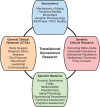Creating the Next Generation of Translational Geroscientists
- PMID: 31287934
- PMCID: PMC6771814
- DOI: 10.1111/jgs.16055
Creating the Next Generation of Translational Geroscientists
Abstract
Advances in understanding fundamental processes of aging have led to a variety of investigational therapies to delay or prevent age-related diseases and conditions. These geroscience therapeutics hold the promise of revolutionizing medical care of older adults by treating the complex syndromes of aging and preserving health and independence. A crucial bottleneck is the study of geroscience therapeutics in early-stage, first-in-human, or proof-of-concept clinical trials. There is a limited pool of clinical investigators with the combination of knowledge and skills at the interface of clinical research, care of older adults, and aging biology needed to successfully design, fund, and implement geroscience trials. Current training pipelines are insufficient to meet the need. The sixth retreat of the National Institute on Aging R24 Geroscience Network brought together basic scientists, gerontologists, clinicians, and clinical researchers from the United States and Europe to discuss how to identify, recruit, and train investigators who can perform early-stage clinical trials in geroscience. We present herein the group's consensus on necessary subject domains and competencies, identification of candidate learners, credentialing learners, and the efficient and rapid implementation of training programs. Foundations and funding agencies have crucial roles to play in catalyzing the development of these programs. Geriatrician investigators are indispensable but cannot meet the need alone. Translational geroscience training programs can create a cadre of groundbreaking investigators from a variety of backgrounds and foster institutional cultures supportive of multidisciplinary translational aging research to turn innovative ideas into transformative therapeutics that can improve the health and independence of older adults. J Am Geriatr Soc 67:1934-1939, 2019.
© 2019 The Authors. Journal of the American Geriatrics Society published by Wiley Periodicals, Inc. on behalf of The American Geriatrics Society.
Figures


Comment in
-
Translational Geroscience: Challenges and Opportunities for Geriatric Medicine.J Am Geriatr Soc. 2019 Sep;67(9):1779-1781. doi: 10.1111/jgs.16056. Epub 2019 Jul 9. J Am Geriatr Soc. 2019. PMID: 31287924 Free PMC article. No abstract available.
Similar articles
-
Geroscience and the trans-NIH Geroscience Interest Group, GSIG.Geroscience. 2017 Feb;39(1):1-5. doi: 10.1007/s11357-016-9954-6. Geroscience. 2017. PMID: 28299635 Free PMC article.
-
Barriers to the Preclinical Development of Therapeutics that Target Aging Mechanisms.J Gerontol A Biol Sci Med Sci. 2016 Nov;71(11):1388-1394. doi: 10.1093/gerona/glw112. Epub 2016 Aug 16. J Gerontol A Biol Sci Med Sci. 2016. PMID: 27535964 Free PMC article.
-
Pharmacotherapy in Older Adults with Cardiovascular Disease: Report from an American College of Cardiology, American Geriatrics Society, and National Institute on Aging Workshop.J Am Geriatr Soc. 2019 Feb;67(2):371-380. doi: 10.1111/jgs.15634. Epub 2018 Dec 7. J Am Geriatr Soc. 2019. PMID: 30536694 Free PMC article.
-
Moving Frailty Toward Clinical Practice: NIA Intramural Frailty Science Symposium Summary.J Am Geriatr Soc. 2019 Aug;67(8):1559-1564. doi: 10.1111/jgs.15928. Epub 2019 May 2. J Am Geriatr Soc. 2019. PMID: 31045254 Free PMC article.
-
The Role of the National Institute on Aging in the Development of the Field of Geroscience.Cold Spring Harb Perspect Med. 2023 Oct 3;13(10):a041211. doi: 10.1101/cshperspect.a041211. Cold Spring Harb Perspect Med. 2023. PMID: 36878648 Review.
Cited by
-
Mikhail 'Misha' Blagosklonny's enduring legacy in geroscience: the hyperfunction theory and the therapeutic potential of rapamycin.Aging (Albany NY). 2025 Jan 12;17(1):1-15. doi: 10.18632/aging.206189. Epub 2025 Jan 12. Aging (Albany NY). 2025. PMID: 39808121 Free PMC article. Review.
-
Osteosarcopenia: A case of geroscience.Aging Med (Milton). 2019 Sep 8;2(3):147-156. doi: 10.1002/agm2.12080. eCollection 2019 Sep. Aging Med (Milton). 2019. PMID: 31942528 Free PMC article. Review.
-
The INSPIRE Bio-Resource Research Platform for Healthy Aging and Geroscience: Focus on the Human Translational Research Cohort (The INSPIRE-T Cohort).J Frailty Aging. 2021;10(2):110-120. doi: 10.14283/jfa.2020.38. J Frailty Aging. 2021. PMID: 33575699 Free PMC article.
-
Cellular senescence and senolytics: the path to the clinic.Nat Med. 2022 Aug;28(8):1556-1568. doi: 10.1038/s41591-022-01923-y. Epub 2022 Aug 11. Nat Med. 2022. PMID: 35953721 Free PMC article. Review.
-
Bringing Geroscience into the Mainstream: From Education to Clinical Practice, What Will It Take?J Gerontol A Biol Sci Med Sci. 2024 Sep 1;79(9):glae020. doi: 10.1093/gerona/glae020. J Gerontol A Biol Sci Med Sci. 2024. PMID: 39126344 Free PMC article. No abstract available.
References
Publication types
MeSH terms
Grants and funding
LinkOut - more resources
Full Text Sources

